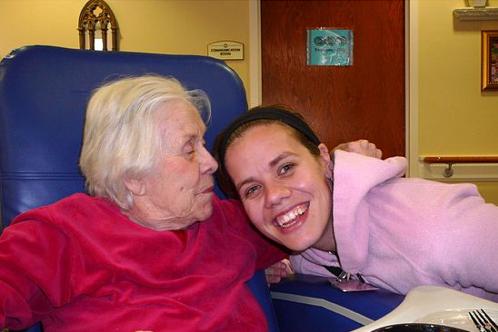|
|
Last Friday afternoon, my Papa called me at work and told me that my 94 year old grandma had a stroke. In a panic, I got on the wrong bus, lost my CTA card in transit, and had to go to the ATM to get money to get a new CTA card to get on the El; but I finally got on the Metra train towards home. Leaving the city of Chicago behind me, I remembered my grandmother: her chocolate chip cookies, her water-skiing in her floral bathing cap, her morning runs, her oatmeal mush, and much more. Some of you may also know someone who has had a stroke, also called a brain attack. Driving to the hospital with my Papa, he asked me all about strokes. I didn't know all the answers, so I did my science research.
Blood vessels carry food and oxygen to the brain. The brain is only about 2% of our total body weight, but it receives 20% of our blood supply. What is a stroke? A stroke happens when the blood supply to the brain is stopped. The brain cells start to die without oxygen from the blood. Paralysis (loss of muscle function) or aphasia (loss of speech) are frequent consequences of a stroke. In the hospital, the doctors informed us that my grandma now has little control over her left side of her body. There are two major causes of a stroke: blockage of a blood vessel in the brain or neck caused by thrombosis (a blood clot in the brain or neck), embolism (a blood clot from somewhere else that has moved and now blocks a blood vessel in the brain or neck), or stenosis (constriction or narrowing of an artery in the head or neck); and bleeding of a blood vessel.
According to the American Stroke Association, 780,000 people suffer a stroke each year (that's one every 45 seconds) in the United States. Stroke is the third leading cause of death in the United States and kills about 160,000 Americans each year. Most strokes occur in people over the age of 65, and the risk of having a stroke doubles every 10 years after the age of 55. According to the National Institute of Neurological Disorders and Stroke, trouble walking, weakness on one side, trouble seeing, and/or trouble speaking may all be symptoms of a stroke.
My grandma had a blood pressure reading of 140/90, and the higher your blood pressure the greater risk you are at having a stroke. What is blood pressure? When your heart pumps, it forces blood through your vessels and this force is called pressure. The top number (140) shows the force of blood in your vessels when your heart pumps, while the bottom number (90) shows the force of blood in your vessels between heart beats. A blood pressure of 120/80 0r lower is normal. You can lower your blood pressure by taking blood pressure medicine, losing weight, exercising more, not smoking, and eating less salty and fatty foods.
My grandma named me Heather Marie, and she will therefore remain with me forever (no matter what happens).
My grandma and me!

-Heather
Author's Note: This was submitted to the blog by Heather, one of our corespondents.
Sources:
http://www.strokeassociation.org/presenter.jhtml?identifier=3030066
http://learn.genetics.utah.edu/content/addiction/reward/cells.html
http://www.nlm.nih.gov/medlineplus/paralysis.html
http://www.nidcd.nih.gov/health/voice/aphasia.htm#what
http://www.strokeassociation.org/presenter.jhtml?identifier=1200037
http://www.ninds.nih.gov/
http://www.americanheart.org/presenter.jhtml?identifier=4473
Editor's Note: For more blogs from Dr. Rabiah, visit Science Chicago's website at: http://www.sciencechicagoblog.com
|